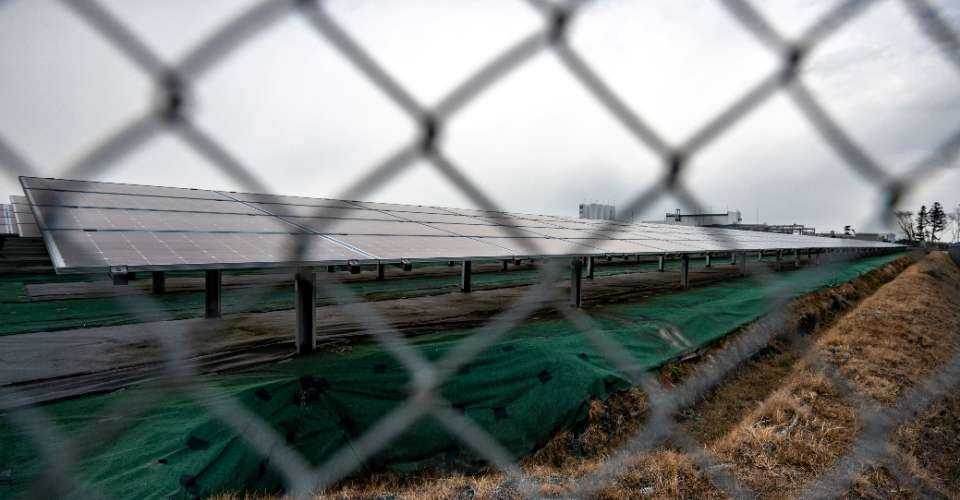
This picture taken on Feb. 3, 2022, shows a section of solar power generation facilities at the Fukushima hydrogen energy research field in the town of Namie in Fukushima prefecture. (Photo: AFP)
The recent surge in thefts targeting large-scale solar power generation facilities across Japan has highlighted not only a criminal trend but also exposed a complex interplay of global market dynamics, cultural differences, and perhaps the unintended consequences of globalization itself.
Specifically, these incidents have seen copper cables for power transmission, an essential component of these "mega-solar" facilities, being cut and stolen.
The Hokuto Site Solar Power Plant in Hokuto, Yamanashi Prefecture, reported that approximately 1,500-meter-long cables were stolen, causing significant economic loss and operational disruption.
This trend can be partly attributed to the rising prices of copper, spurred by global events such as Russia's invasion of Ukraine, among other factors.
Copper, a critical material used extensively in electrical engineering, construction, and various industries, has seen its value increase on the international market, making it a lucrative target for theft.
The openness and accessibility of information online about the locations and layouts of the solar facilities further exacerbate the vulnerability of these sites to such criminal activities. This phenomenon stresses a vulnerability inherent to the digital age: the ease of access to sensitive information through the internet.
Japan, a nation that prides itself on transparency and the accessibility of public information, is facing a unique challenge as it masters the complexities of maintaining this openness in a global context.
The detailed information available online regarding the locations and architectural specifics of these "mega-solar" facilities has inadvertently served as a blueprint for criminal activities. This situation highlights the emerging conflict between two sets of principles, open information, and the security of critical infrastructure.
This global accessibility raises questions about how nations can protect their assets while adhering to values of transparency and openness. It calls for a re-evaluation of the strategies used to share information about critical infrastructure, perhaps necessitating more careful approaches that balance the need for public access with the imperative of security.
But there is also another part to this complex puzzle.
Despite much effort from the mainstream media to couch this emergency as an “internal problem,” emphasizing that the ultimate buyers of these copper wires were Japanese nationals, it is much like what is already happening in Europe.
Many similar thefts in Europe are committed by Romanians, while in Japan, it is Cambodian nationals who are involved. So, these thefts bring to light the broader issue of cultural, political and economic disparities.
Cambodia, a country with a brutal history is a developing economy today. It presents an almost opposite setting to Japan, known for its advanced technology and strong economy.
This profound disparity between the economic and political circumstances in Cambodia and more developed nations like Japan not only fuels individual acts of desperation or opportunism but also creates a fertile ground for international criminal organizations seeking to exploit these conditions.
Cambodia's emerging status, combined with its unique political environment with no genuine space for internal opposition makes it an attractive base for operations that are both illicit and harmful, such as human trafficking and online scams.
Moreover, the aspect of cultural differences should not be overlooked.
Japan, with its exceptional social norms and values, including a strong emphasis on social harmony and respect for property, contrasts with the cultural landscape of Cambodia, where decades of conflict and economic challenges have shaped a different set of social norms and survival strategies.
In Cambodia, where Buddhism's teachings form the ethical backbone of society, advocating for a life of honesty and compassion, the glaring gap between these moral ideals and the daily realities many face is contrasting.
Buddhism, deeply ingrained in Cambodian culture, promotes a path of righteousness, discouraging any form of theft or harm. Yet, the country's challenging economic and political conditions and the enduring impact of historical adversities create a context in which the principles of faith are tested against the pressing needs of survival.
This pervasive state of financial insecurity often forces individuals into a corner, where the moral clarity offered by Buddhism meets the murky waters of survival instinct.
*The views expressed in this article are those of the author and do not necessarily reflect the official editorial position of UCA News.


